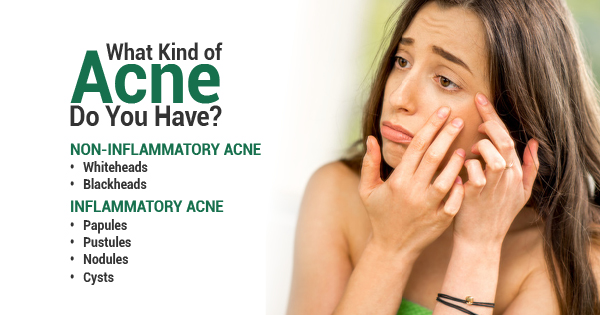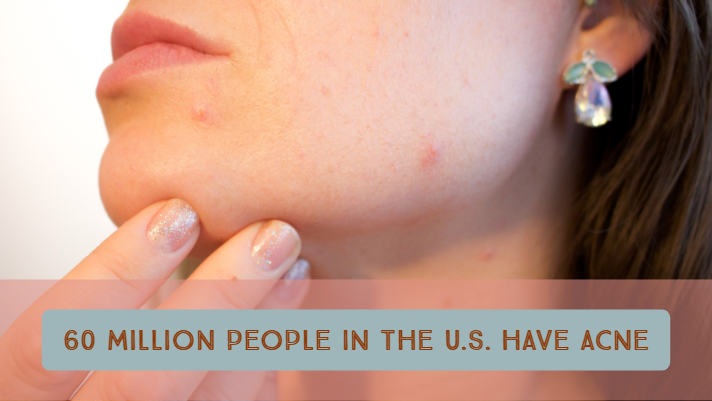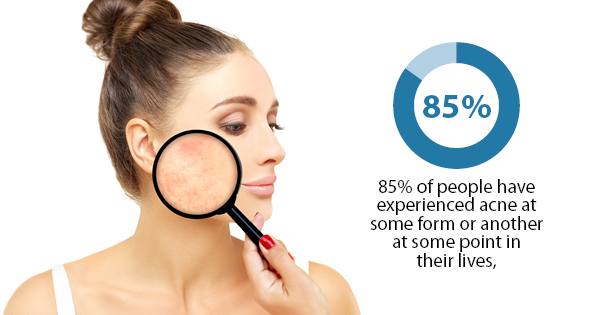
Zoning In on Zits: What Kind of Acne Do You Have?
Most people experience breakouts at some point in their lives. But if you suffer from more serious acne, you may find your self-esteem is suffering, too. Even though the skin renews itself every 28 days, that doesn’t mean that your struggles with acne are short-lived. In fact, more serious types of acne can persist for decades if you don’t seek out help from a dermatologist.
Before you talk to your dermatologist about which acne treatment options are most appropriate for your case, you may want to learn a bit more about the different types of acne that may be affecting you. We’ll outline the two main categories of acne below, as well as specific types of pimples you may recognize from your own experience.
Non-Inflammatory Acne
This category of acne is considered to be a bit easier to treat due to the lack of infection. These pimples, also known as comedones, are really pores that contain sebum (a type of oil your skin needs in moderation) and skin cells. But unlike inflammatory acne, they don’t usually hurt or cause any kind of physical discomfort. There are two main types of pimples that are categorized as non-inflammatory: whiteheads and blackheads.
Whiteheads are essentially pores containing dead skin cells and sebum that are covered by a thin layer of skin. This forms a little white plug. Whiteheads are not usually infected, but they can become infected if you try to extract them yourself because bacteria can infiltrate the skin cells around the pimple. Whiteheads are commonly found on the face and typically stick around for about a week.
Blackheads are pores that stay open and allow the clogged sebum inside the pore to oxidize. This oxidation makes the sebum hard and also mixes with your skin pigment to turn the pimple to a dark color (which can appear gray, brown, or black). You may have seen them on your nose, forehead, or chin. They can also appear on your chest or back. A word to the wise: those blackhead removal strips aren’t really going to do you much good, nor should you extract them yourself.
Inflammatory Acne
Inflammatory acne is caused by a bacterial infection, which makes this type of acne more difficult to treat in general. It occurs when the pore’s wall is ruptured (often through extraction or picking!), which allows oil and bacteria in. Your body will react by calling in the white blood cells to fight the infection, and that causes the ruptured area to become swollen, red, and/or inflamed. This can be incredibly painful. There are generally four different kinds of inflammatory acne: papules, pustules, nodules, and cysts.
Papules are small raised bumps that are pink or red in color and do not contain any pus. They may be inflamed and tender to the touch, but they are usually painless unless scratched.
Pustules, like their name suggests, do contain pus — which is actually just dead white blood cells. These pimples are yellow or white in the center and are surrounded by a red, inflamed base. They can be very tender to the touch and generally look “angry.”
Nodules look a bit like papules but are usually larger and form deeper in the skin. They’re also more painful and can be present for a long time. They may feel stiff to the touch and can cause significant tissue damage and visible scarring.
Cysts are generally the most serious form of acne and one of the most difficult to treat. They form deep below the surface and contain pus. They can be incredibly painful, both physically and emotionally. It’s certainly rarer than other kinds of acne and usually requires the help of a dermatologist to treat effectively.
It’s common for patients to have a combination of non-inflammatory and inflammatory acne. Because every individual has different skin concerns, it’s important to consult with a dermatologist who focuses on acne treatment options for your needs. Our virtual acne programs have worked wonders for countless patients without the added stress of in-person appointments. To find out more about how our program works, please contact us today.








No Comments
Sorry, the comment form is closed at this time.